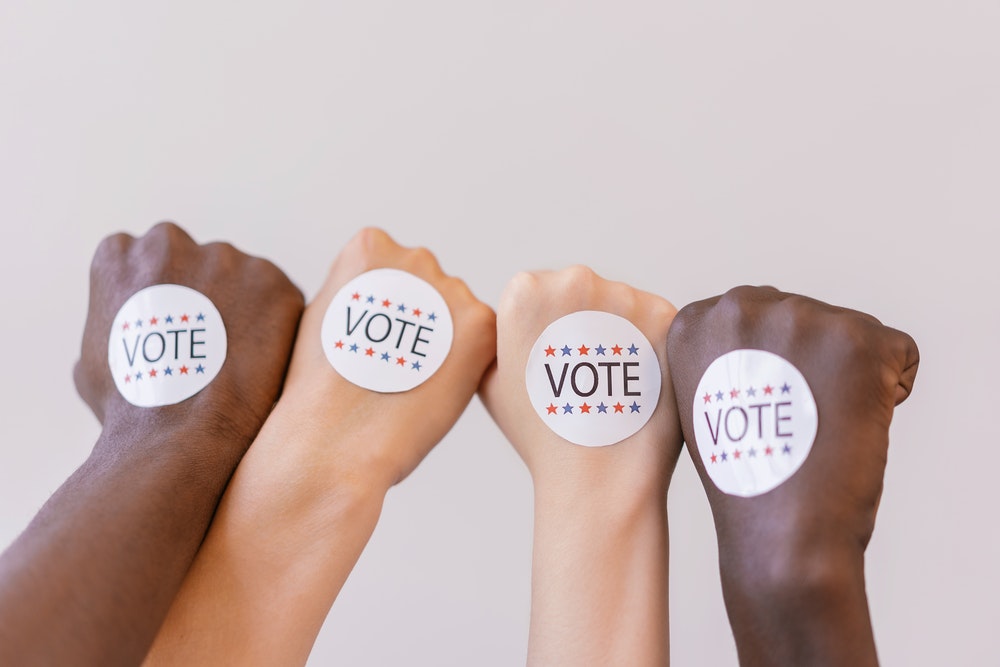
In the United States, ease and security of voting is not a given.
Even in 2022, there’s a chance you won’t be able to vote the next time you go to the polls, your voter information could be compromised, or your ballot could be thrown out.
Primaries have not been pretty so far.
Today I was turned away from a polling booth in my hometown of Houston. I have voted in every major election since the age of 18 years old as is my right as an American. I take this so seriously that I’ve applied for absentee ballots when out of the country.
THREAD!
— Richelle Carey (@RichelleCarey) March 1, 2022
In a perfect nation, every citizen would be able to vote easily, without waiting in line or worrying that something might happen to their ballot. Ideally, we’d all be able to just press a button from wherever we are and vote securely.
Which is why blockchain — that invisible, secure technology that is commonly used for cryptocurrency and NFTs — has been pitched for years as the answer. An asset in the blockchain can, in theory, never be touched or altered by unverified entities, whether it be a virtual coin, digital artwork, a contract or a vote.
What blockchain voting could mean (in theory)
Annika Jacobsen of Agora Technologies in Switzerland waited for hours to vote in the 2016 election in her small American town of 500, only to later learn that, like millions of other Americans, her voter information had been compromised. In a 2019 TEDxZurichSalon talk, Bringing Voting Systems into the Digital Age with Blockchain, she detailed how, ideally, blockchain could have prevented what happened in 2016 and ensure more secure voting, even in countries with weak or corrupt democratic systems.
On paper, it sounds great: No lines, and no wondering if your vote was counted. You as a verified voter can even change your vote until the deadline and confirm that your vote is correct after the election. Votes are tallied instantly, with no potential for tampering with ballots during a hand count or recount.
All you would have to do is download an official voting app, verify yourself, and vote from home — or anywhere in the world.
Of course, this is all theoretical for now. And there are a lot of people who don’t want to see blockchain voting, including MIT experts who came out strongly against blockchain voting, saying that it’s far more vulnerable to a large-scale attack than paper ballot voting.
USPS and blockchain voting
Blockchain voting was tested in the United States at least once. It’s a story that has been mostly forgotten, though it’s only a couple of years old:
In early 2020, as the Trump administration was trying to shut down the US Postal Service ahead of the presidential election, the USPS — responsible for millions of mail-in ballots — applied for a patent for a “Secure Voting System” described as “a voting system that can use the security of blockchain and the mail to provide a reliable voting system.” In this system, registered voters would receive a computer readable code in the mail that would verify them to vote anonymously via blockchain technology.
(It may be worth noting that the USPS method, supposedly designed to relieve voters of reliance on a disrupted mail service, relied on mailed codes.)
When the experiment went public, blockchain was declared a failure as a tool for voting. In fact, the conclusion was that it was less secure than the very unsecure non-blockchain internet voting. Ever since then, it’s been widely considered common knowledge that blockchain would be bad for voters.
Blockchain voting concerns
Concerns about blockchain voting are all over the place — enough that we’re probably not going to see it on the table as a viable method of voting for a while. They include:
- Verification would involve a process not unlike voter ID laws, which have been shown to exclude eligible voters in marginalized groups with a higher-than-average number of people without a driver’s license or ID. Those gaps, it should be noted, are caused by systemic issues that should be addressed regardless.
- There is also the issue, potentially, of lack of access to a smartphone for voting.
- Another issue cited is that the technology just isn’t ready to be used in such a way, where an error or breach could destabilize a nation.
- Even if blockchain does work the way they say it will, it’s not a cure-all. Misinformation campaigns and gerrymandering would still exist if voting moved to the blockchain today.
- And, because politicians across the nation work tirelessly to make voting hard for citizens, there are concerns that if blockchain can do what it says it can do, it will make voting too easy and accessible, threatening the status quo.
Paper ballots are going to be left behind for something newer and better someday. It’s clear from Annika Jacobsen’s story — one shared by many other Americans — that the “tried and true” method has been vulnerable for years now.
So, is it a question of the blockchain being ready, or is it a question of the people being ready?
-30-"used" - Google News
March 10, 2022 at 07:06AM
https://ift.tt/LZGkc1P
Will blockchain technology ever be used for voting? - Technical.ly
"used" - Google News
https://ift.tt/rNGDWYE
https://ift.tt/AO3gphz
Bagikan Berita Ini














0 Response to "Will blockchain technology ever be used for voting? - Technical.ly"
Post a Comment